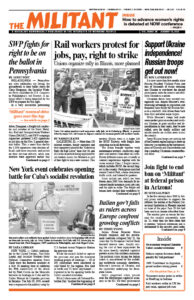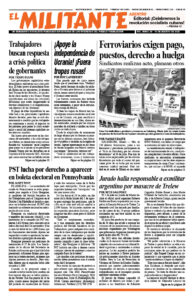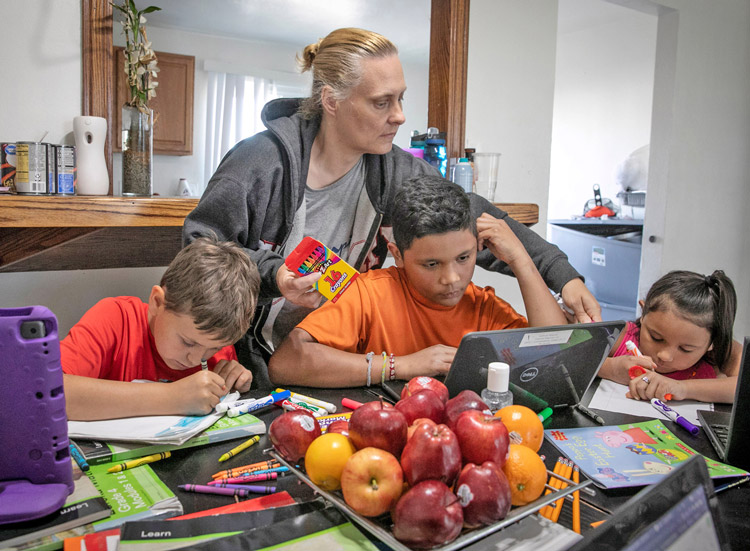CHICAGO — Some 250 women and men gathered for the National Organization for Women conference here July 22-24 to discuss how to advance the fight for women’s equality at a time when soaring prices and a deepening capitalist crisis are wreaking havoc on working people, our families and our unions.
The conference took place in the wake of the June 24 U.S. Supreme Court’s ruling in Dobbs v. Jackson Women’s Health Organization that overturned the court’s 1973 Roe v. Wade decision, ruling that it had no basis in the Constitution. The court then had acted as if it were a legislative body, not a court, to create a way to decriminalize abortion across the country. Their ruling cut short the public fight needed to win support for women’s rights. The Dobbs ruling neither approves nor bans abortion, but returns that decision to the people and their elected representatives.
A number of Socialist Workers Party members participated, taking part in wide-ranging discussions in workshops, over meals and at the busy information tables outside the conference hall, including one staffed by party members.
The conference theme — “Save our democracy, vote for womxn’s lives!” — expressed the view of the NOW leadership that a rising rightist threat — led by former President Donald Trump and an “illegitimate” Supreme Court — is dealing blows to women’s rights and other hard-fought conquests. Many make the false claim that the Dobbs ruling makes abortion illegal.
Their solution, presented to the conference, is to subordinate everything to electing Democrats. “We cannot lose the Senate or House,” Eleanor Smeal, president of the Feminist Majority and former NOW president, told the conference.
Opportunities for discussion
At the same time, many participants were open to discussing a working-class perspective. Some are active in the labor movement, fights against police brutality and other struggles, as well actions in defense of women’s rights.
Stephanie Jutras, a mental health counselor in Dallas, joined SWP members Kaitlin Estill and Naomi Craine for lunch. Craine is the SWP candidate for Illinois governor.
“We can’t start with abortion in the fight for women’s emancipation,” Estill said. “We have to start from the broader assaults on working people, and our fight against attacks by bosses and their government on our jobs, wages, social conditions like child care and health care, and our rights that are tearing apart our families and lives.”
“A young person can’t imagine having children if you can’t even get a place of your own,” Craine added. “And for working-class families who want to adopt children, the process is tied up in red tape. Part of this fight is for access to family planning, including contraception and abortion for those who need it.”
“The ability to have or not have children and then to be able to support them should be a right,” Jutras replied.
“A lot of the strikes recently have been over irregular schedules and forced overtime,” said Craine, a railroad conductor and member of the SMART-TD union.
“In the old days, the thinking was eight hours of work, eight hours of sleep, and eight hours to spend how you liked,” Jutras responded.
“Getting back to the eight-hour workday would be progress for the working class,” Craine said, “and for those trying to raise a family. It’s important to support strikes against attacks on wages and working conditions, like the United Mine Workers strike against Warrior Met Coal in Alabama. We’ve turned a corner from the all-time low of labor resistance. Working people need to build a labor party that represents our class interests, in elections and in labor and social struggles.”
Jutras liked what Estill and Craine said when they explained Cuba’s socialist revolution — what it shows about the capacities of working people to take political power into our own hands. She got a Militant subscription and said she’d contact the SWP in Dallas-Fort Worth.
Debate over perspectives
Pessimism about openings to win support for women’s rights pervaded conference presentations. “There’s no good news,” David Stewart, vice president of Quad Cities, Iowa, NOW, told a workshop on “Abortion Access in Codified Roe States.” Panelists discussed hunkering down to make “abortion sanctuaries” in Democratic Party-dominated states, such as Illinois, New York and California.
“Let’s not call those who oppose abortion backward or rightist,” I said in the discussion. “Let’s win people in every state to defend the ability of workers to have a family, including women’s access to contraception and abortion.
“Roe was a blow to the fight for women’s equality. It undercut the fight for hearts and minds that was just beginning, imposing a policy many hadn’t yet been convinced of. The Dobbs decision was right, Roe was unconstitutional. Working people need a court that upholds protections in the Constitution, not one that makes legislation.
“Democrats have the presidency and both houses of Congress,” I added, “and how has that helped working people or women?” A few people applauded.
In a workshop on “Global Feminists,” SWP member Ilona Gersh described how leaders of Cuba’s socialist revolution fought to advance the full participation of women at all levels, providing maternity hospitals and child care and decriminalizing abortion.
“What about human rights violations in Cuba?” interjected workshop chairperson NOW New Jersey President Anjali Mehrotra.
Thirteen administrations — Democrat and Republican alike — have tried to overturn the Cuban Revolution, I replied. “The U.S. rulers carry out an economic war against the Cuban people and they spread lies about their revolution. While they face problems, which Cubans openly discuss, especially from Washington’s attacks, it’s a country where human solidarity dominates social relations and where the emancipation of women has made huge strides.”
Pramila Venkateswaran, a Nassau Community College English professor and a member of Suffolk County NOW, said, “I think solidarity is so important,” pointing to support won by farmers in India fighting to defend their livelihoods, union workers in Bangladesh and by the Dalit, people belonging to the lowest social “castes” in India. In the workshop “Climate Justice is a Women’s Rights Issue,” Gabrielle Prosser, SWP candidate for Minnesota governor, responded to comments blaming men for “dominating women and nature.”
“We need to organize on a class basis. Men aren’t the problem,” she said. “All wealth comes from labor and nature, and capitalism exploits both. Only the working class can be the steward of nature.”
SWP members got a hearing when we presented a working-class road forward and found a number of conferencegoers who sought us out for more discussion. Twenty subscriptions to the Militant, and 53 books on revolutionary working-class politics were picked up by participants.


